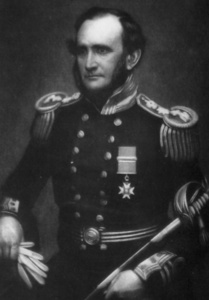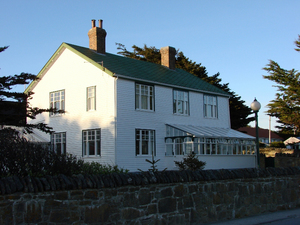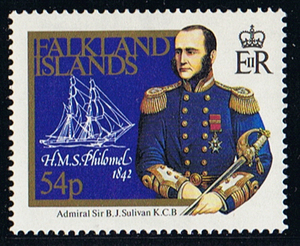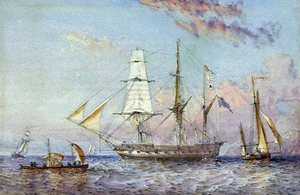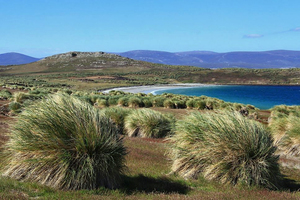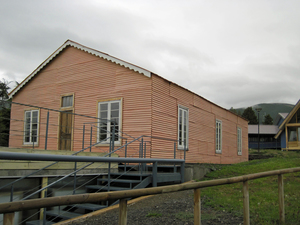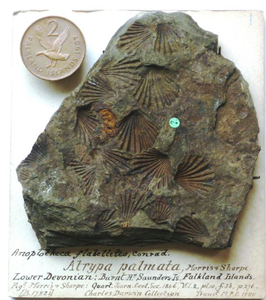SULIVAN, Sir BARTHOLOMEW JAMES
1810 - 1890 from England
naval officer, hydrographic surveyor and farmer, was born on 18 November 1810 at Tregew in the parish of Mylor on the banks of Falmouth Harbour, the eldest son of Captain Thomas Ball Sulivan and Henrietta, née James. On 4 September 1823 Sulivan entered the Royal Naval College, Portsmouth, where he passed with distinction. His first appointment as a midshipman was to the Thetis, where he remained until 1828, when she came into Río de Janeiro at about the same time as one of her former lieutenants, Robert FITZROY, was promoted in command of the Beagle. At FitzRoy's request, Sulivan joined the Beagle on 15 December 1828, but in view of his approaching examination for lieutenant, his stay on board was short. On 12 February 1829 he joined the Ganges and on 12 April the North Star, for passage home. On 29 December 1829 he passed for lieutenant and on 3 April 1830 he was promoted lieutenant and, at FitzRoy's request, was again appointed to the Beagle, remaining in her during her famous voyage, during which he formed a lifelong friendship with Charles DARWIN.
On board the Beagle Sulivan made two visits to the Falklands in 1833 and 1834. On her return to England in November 1836, at the end of her round the world voyage, Sulivan was placed on half-pay. On 14 January 1837 he married Sophia, the third daughter of Vice-Admiral James Young; eight children were born to the couple. In December of that year he was appointed in command of the schooner Pincher for service on the west coast of Africa, but a few weeks later, again at the recommendation of FitzRoy, he was appointed in command of the cutter Arrow to carry out surveys in the Falkland Islands. Sulivan arrived in Berkeley Sound on 15 October 1838. In spite of poor health he surveyed Port William, Stanley Harbour and Port Harriet, followed by Port Fitzroy, which he named after his former commanding officer, Port Pleasant and Kelp Lagoon, the eastern part of Choiseul Sound and nearby inlets. At the end of the southern summer Sulivan made for Río de Janeiro, from where he was invalided home, arriving in England in June 1839. The fact that he was attacked in the Falklands by a wild cow and severely shaken must have affected his health. Lieutenant William Robinson of the Stag, wearing the broad pennant of Sulivan's father, Commodore Thomas Ball Sulivan, was appointed to the Arrow in his place. Sulivan was awarded £100 for his work in the Arrow. On his return to England, Sulivan wrote an account of the climate and soil of the Falkland Islands, which was published in The Nautical Magazine in 1841. His second in command, Lauchlan Bellingham MACKINNON also wrote an account of the Arrow's six months in the islands.
On 14 May 1841 Sulivan was promoted commander and on 2 April 1842 he was appointed in command of the brig Philomel to continue the survey of the Falklands. He arrived at Berkeley Sound on 14 October 1842, where he found a party of officers which Captain James Clark ROSS had left behind to carry out magnetic observations, Ross himself having sailed a month previously for St Martin's Cove in Tierra del Fuego. The only improvement that Sulivan found in Port Louis was a small house built by Mr JB WHITINGTON; he remarked that Whitington's sheep 'have stood it so well, it shows the climate is well adapted to them'. Shortly after his arrival, Sulivan set off on a cruise, which took him nearly round both islands, returning to Berkeley Sound on 22 November, having climbed most of the hills to establish triangulation stations. On his return Sulivan found the Terror and Erebus at anchor in Port Louis, which enabled Ross to acquaint him with the exact position of Burdwood Bank, in the expectation that Sulivan would carry out a more accurate examination of the bank than Ross himself had been able to do.
On 1 April 1843 Sulivan returned to Montevideo, a month earlier than intended as a schooner bringing provisions for him had apparently been lost. Here, on 1 June, he was joined by his wife and his three daughters who had come out in the Falmouth packet in spite of the fact that South America at the time was in a state of insurrection. During the months that Sulivan was at Montevideo he carried out various surveys in the River Plate. On 6 November Sulivan returned to Berkeley Sound, taking his family with him in view of the unsettled situation in Montevideo. He was in time to assist Governor Richard Clement MOODY move the settlement from Port Louis to Stanley, a move with which Sulivan agreed. During this visit Sulivan surveyed Burdwood Bank, as suggested by Ross. Sulivan's eldest son James Young Falkland was born at Port Louis on 16 March 1844; he was thought to be the first British subject born in the islands. (See editorial note below) Sulivan returned to Montevideo on 11 May 1844.
On 26 October 1844 the Philomel sailed again for the Falklands, with Mrs Sulivan and her family on board. It appears that Mrs Sulivan set up home in Stanley during this visit since she made a small botanical collection from the vicinity of Stanley during one of the Philomel's visits to the Islands. Sulivan remained in the Islands until the following April during which he ran a line of deep sea soundings as far as Cabo Virgenes in Patagonia, entering Río Gallegos to water ship. He also sounded round Beauchêne Island and even managed to land on it.
Shortly before leaving the Falklands Sulivan encountered difficulties with Governor Moody, which he was forced to report to his senior officer, Commodore JB Purvis, in Montevideo. Moody had dismissed his private secretary, Murrel Robinson ROBINSON, from his post. However, shortly after Robinson's dismissal he was received on board the Philomel by Sulivan and his officers as he had always been. As a result Moody wrote to Sulivan stating that it was his wish that Sulivan and his officers should not continue to associate with Robinson. This Sulivan was not prepared to do as he felt he was not obliged to interfere in what he considered were matters of 'the most private nature'. A further disagreement between them arose when Moody attempted to send two mutineers on board the Philomel for passage to Montevideo with a warrant for them to serve a twelve-month sentence in England. Sulivan at first declined to accept them saying that it was impossible to make a prison out of his ship. Eventually a compromise was reached and the prisoners were accepted on board without a warrant. Sulivan may additionally have been concerned that his wife and four children would also be on board for the passage to Montevideo.
Sulivan arrived back in Montevideo on 19 April 1845. At first his time was occupied in completing his charts of the Falklands and adding to his surveys of the River Plate. However, on 28 August active operations were begun by the combined British and French squadrons against General ROSAS, in which the Philomel was to take part. In consequence Mrs Sulivan, with her children, returned to England. Sulivan took a prominent part in the ensuing conflict, which resulted in him being promoted captain on 18 November 1845.
When the promised command of another ship was not forthcoming and Sulivan saw no prospect of employment at sea, he began to suffer in health. In consequence he obtained leave from the Admiralty to go abroad for three years. Instead of going to the south of France, as advised by his doctor, Sulivan decided to go out to the Falklands instead, taking his family with him. In 1848 he chartered a sailing ship, taking with him some good stock animals. Mrs Sulivan and her family set up home in a house in Stanley, built by Sulivan, and now known as Sulivan House. While Sulivan was farming in the Falklands, Henry Norton Sulivan was born on 25 January 1846. For a time he was nursed by 'an Indian princess, descended from a royal South American line, a Diana of the chase' who was surely Antonina.ROXA.
In 1850 HMS Rattlesnake, Lieutenant Charles Yule, returning to England from a surveying voyage to the east coast of Australia, called at Stanley. (Thomas Henry Huxley, assistant surgeon on board the Rattlesnake described Mrs Sulivan's house as black and unpromising.) After leaving Stanley, Yule took the Rattlesnake to Berkeley Sound, where her naturalist, John Macgillivray, accompanied Sulivan in order to watch his gauchos, one of whom was named Andrez Pelaluya (presumably PITALUGA), catch some cattle required for the ship with lasso and bolas *. The two landed on Hog Island, where Sulivan's herd of eleven hundred cattle and some horses had been kept during the winter to feed on the tussock grass fringing the shore. Sulivan's establishment was on the mainland opposite, reached by a ford at low water. When his three years's leave was about up, Sulivan returned to England in the autumn of 1851. Sulivan considered tussock grass (Poa flabellata) to be of the greatest value and introduced it to a Scottish landowner who planted it in Stornoway, where it answered all expectations. Unfortunately it did not survive owing to the neglect of the injunction 'not to let the cattle feed on the plant', but to cut it for them.
With the outbreak of the Crimean War, Sulivan was appointed in command of the tiny paddle steamer Lightning to assist the Baltic fleet under the command of Vice-Admiral Napier 'for surveying and pilotage duties'. This culminated in Sulivan making a survey in the face of the enemy of the approaches to Bormarsund, the Russian fortress in the Åland Islands, which led to its capture by allied forces.
Sulivan's last service afloat was in command of the paddle steamer Merlin, for service in the Baltic in 1855. In July of that year he was made a CB. He was made a Rear-Admiral in 1863, a Vice-Admiral in 1870 and an Admiral in 1877. In 1869 he was appointed a KCB.
He died at his home in Bournemouth on 1 January 1890.
Sulivan was a staunch supporter and committee member of the Patagonian (later the South American) Missionary Society and was their nautical adviser. Together with friends, he raised enough money to fit out the mission schooner Allen Gardiner and establish the society's local headquarters in Keppel Island, their main house being named Sulivan House in honour of their committee member. When the Rev G DESPARD was about to return to Tierra del Fuego, Sulivan wrote to the Hydrographic Office asking for an advance proof of the Keppel Island chart for him. The Sulivans' eighth child was named Allen Gardiner after the missionary Captain Allen GARDINER, who died on the shores of Tierra del Fuego in September 1851.
Sulivan was an outstanding officer both as a surveyor and for his strategic grasp in time of war, which earned the admiration of all who knew him. A humane and amiable man with strong Christian principles he was reluctant to engage in hostilities on Sundays and on one occasion in the Baltic declined to bombard defenceless Russian infantry on humanitarian grounds.
He is remembered by Sulivan House in Stanley, residence of the colonial secretary and later the chief executive. He also features in a set of Falklands stamps celebrating naval surveyors.
Editorial note:
From the book: The wreck of the Isabella; by David Miller; published 1995 by Annapolis: Naval Institute Press:
'The ship Isabella was wrecked 8 February 1813 on Speedwell Island. On board was Joanna-Ann Durie who was heavily pregnant. Joanna-Ann Durie gave birth to her daughter in a hut on Eagle Island Sunday 21 February 1813 and the baby was named Eliza Providence Durie. Both parents were British.'
Also:
The Jane Cameron National Archives in Stanley holds the first birth, baptism, marriage and death register used in the Falkland Islands. This register shows that:
1. At Port Louis, Matilda Amelia Pierce was born 23 September 1838 and her brother Frederick Navarro Pierce was born 8 November 1839; both to a British father so under the law of the time were both British subjects.
2. Emma Falkland Dean was born 20 June 1842 at Port Louis; both her parents were British.
External links
See: Life and letters of the late Admiral Sir Batholomew James Sulivan (published by John Murray 1896)
References
Phil Stone; Bartholomew Sulivan's geological observations in the Falkland Islands 1838-1845 as communicated to Charles Darwin; Falkland Islands Journal: 2012
Comments
Revisions
October 2019 Two external links added; two photographs added; editorial note added to main text
January 2020 Three additional photographs added
October 2020 One additional photograph add; one reference added; one external link added
